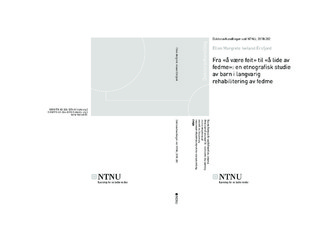| dc.contributor.advisor | Tingstad, Vebjørg | |
| dc.contributor.advisor | Larsen, Tord | |
| dc.contributor.author | Ersfjord, Ellen Margrete Iveland | |
| dc.date.accessioned | 2019-01-09T12:16:19Z | |
| dc.date.available | 2019-01-09T12:16:19Z | |
| dc.date.issued | 2018 | |
| dc.identifier.isbn | 978-82-326-3355-5 | |
| dc.identifier.issn | 1503-8181 | |
| dc.identifier.uri | http://hdl.handle.net/11250/2579944 | |
| dc.description.abstract | Sammendrag
Denne avhandlingen er et bidrag til kritisk refleksjon over hvordan barn med fedme blir forstått og behandlet innen pediatrisk fedmerehabilitering. Min studie befinner seg innenfor rammeverket til den sosiale barne- og barndomsforskningen. Deltagende observasjon ble brukt som metode for datainnsamling. I denne avhandlingen, som består av et bokkapittel, to artikler og en sammenfatningsartikkel, har jeg undersøkt konstruksjoner av barn og barndom innen pediatrien som barnemedisinsk vitenskap og hvordan dette har påvirket innholdet i rehabiliteringstilbudet. Jeg har også undersøkt hvordan barn med fedme blir påvirket av det biopedagogiske innholdet i rehabiliteringstilbudet gjennom å analysere endringer i barnas språk om mat og fysisk aktivitet og om kroppen og tilstanden deres.
Biopedagogikk handler om hvordan den såkalte fedmeepidemien har skapt pedagogiske praksiser eller «instruksjoner» om hvordan folk skal «leve sunt». Disse fungerer normaliserende og regulerende, og plasserer individer under kontinuerlig overvåkning og skaper økt selv-monitorering.
Innen pediatrisk fedmerehabilitering er det i dag mest vanlig å bruke såkalte familiebaserte tilnærminger hvor målet er å påvirke barns vektrelaterte atferd gjennom foreldrene. Dette var tilnærmingen til barna og deres familier også på rehabiliteringssentrene hvor jeg gjorde hovedfeltarbeid. Selv om det var foreldrene som stort sett fikk undervisning i kosthold og fysisk aktivitet, viser min forskning at barna likevel plukket opp og tok til seg rehabiliteringsteamenes biopedagogiske budskaper om mat, fysisk aktivitet og årsaker til utvikling av fedme. De fleste barna ble også sterke agenter i familiens livsstilsendringsprosess. Forskere innen rammeverket til biopedagogikk hevder at formuleringen av biopedagogiske budskap og instruksjoner til barn kan føre til økt, og farlig, selv-monitorering ved at de kan utvikle spiseforstyrrelser eller et «hemmet» forhold til kropp og fysisk aktivitet. Selv om barna med fedme utviklet nettopp slik økt selv-monitorering, argumenterer jeg for at biopedagogikken også fungerte som en ressurs ved å gi dem en følelse av kontroll og mestring av lidelsen. Det ga dem også et endret syn på kroppen deres, slik at forståelsen «jeg er feit» ble byttet ut med «jeg lider av fedme». I denne avhandlingen tolker jeg dette som en prosess av medikalisering hvor barna tar til seg den biomedisinske forståelsen av sin lidelse. | nb_NO |
| dc.description.abstract | Summary
This thesis contributes to a critical reflection of treatment of children with obesity. My study is localized within the framework of social studies of children and childhood. Participant observation was the main method for data collection. This thesis is built around one book chapter and two articles. I have explored constructions of children and childhood within pediatrics, and how these affect the content of treatment. Also, I have explored how children with obesity were affected by the biopedagogical content involved in treatment by analysing changes in the children’s language about food, physical activity, their bodies and their condition.
Biopedagogies is about how the so-called obesity epidemic has created pedagogical practices or “instructions” of how people are supposed to “live healthy”. These biopedagogies are normalizing and regulating, and place the individual under constant surveillance and create increased self-monitoring.
Within pediatric obesity treatment today, it is common to use so-called family-based approaches in order to influence the children’s weight-related behaviours indirectly through the parents. This was also the approach taken by the rehabilitation teams towards the children and their families in my study. Even though it was the parents that got lessons in diet and physical activity, my research shows that the children still picked up the rehabilitation teams’ biopedagogical instructions and discourses about food, physical activity and their condition. Most children also became strong agents in their families’ life style change process. Researchers within the framework of biopedagogies emphasise the dangers involved with conveying biopedagogical messages and instructions to children, claiming it can lead to increased, and dangerous, self-monitoring, making children develop eating disorders or an impaired relationship with their bodies and physical activity. Even though the children I observed developed such increased self-monitoring, I claim that the biopedagogies also functioned as a resource by giving them a sense of control and helping them cope with their condition. Due to the biopedagogies involved, the children went through a transformation from viewing themselves as “being fat” to “suffering from obesity”. In this thesis, I interpret this as a result of a process of medicalization of their condition. | nb_NO |
| dc.language.iso | eng | nb_NO |
| dc.publisher | NTNU | nb_NO |
| dc.relation.ispartofseries | Doktoravhandlinger ved NTNU;2018:282 | |
| dc.relation.haspart | Paper 1: Ersfjord, Ellen M. Iveland. Pediatriens konstruksjoner av barn og barndom. I: Helsesosiologi: Analyser av helse, sykdom og behandling. Gyldendal Akademisk 2012,. s. 177-193 | nb_NO |
| dc.relation.haspart | Paper 2: Ersfjord, Ellen Margrete Iveland. 'Look mommy, I'm eating the plate model!' Biopedagogies and coping with obesity through objectification. Sociology of Health and Illness 2018 ;Volum 40.(5) s. 793-806
https://doi.org/10.1111/1467-9566.12726 | nb_NO |
| dc.relation.haspart | Paper 3: Ersfjord, Ellen Margrete Iveland. Taking children's humor seriously: A study of humor in children diagnosed with obesity and the medicalization of body weight. Childhood 2018 ;Volum 25.(2) s. 189-202
https://doi.org/10.1177/0907568218760379
© The Author(s) 2018
Reprints and permissions:
sagepub.co.uk/journalsPermissions.nav | nb_NO |
| dc.title | Fra «å være feit» til «å lide av fedme»: en etnografisk studie av barn i langvarig rehabilitering av fedme | nb_NO |
| dc.type | Doctoral thesis | nb_NO |
| dc.subject.nsi | VDP::Social science: 200::Education: 280 | nb_NO |
